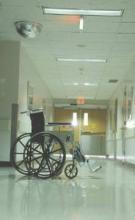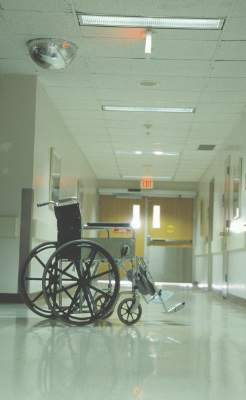User login
After a year-long delay, Medicare officials are implementing bundled payments for a number of services performed in hospital outpatient departments.
The new payments, which were finalized in the 2015 Medicare Hospital Outpatient Prospective Payment System rule, take effect on Jan. 1, 2015.
The Centers for Medicare & Medicaid Services (CMS) selected 25 primary services and their adjunctive services and supplies as comprehensive ambulatory payment classifications (C-APCs) and will provide a single payment under Medicare Part B. Medicare beneficiaries will pay a single copayment for the C-APC services.
The 25 C-APCs fall within 12 clinical families and include gastrointestinal procedures.
Overall, the HOPPS payment codes for GI services were given a positive update for 2015. For example, endoscopic retrograde cholangiopancreatography stent procedure (43274, 43276) payments increased by 64%; esophagoscopy and EGD with endoscopic mucosal resection (43211, 43254) were reassigned, resulting in a payment increase of about 60%; and drainage of pseudocyst (43240) also benefited from reassigment and netted an increase in payment of about 90%. Nearly all of the APCs containing GI procedures saw payment increases, anywhere from 1% for ERCP (0151), to 152% for level II noninvasive physiologic studies (0096).
Medicare Physician Fee Schedule
In the final rule, CMS outlined a new review process that will allow new and revised codes to be published in the proposed rule for public comment. Previously, the values for new and revised codes were not released until the final rule, leaving physicians with little time to prepare for changes in payment.
CMS delayed its valuation of lower GI codes, including colonoscopy, until 2016, as requested by the presidents of the American Gastroenterological Association, the American College of Gastroenterology, and the American Society for Gastrointestinal Endoscopy. The three societies have been advocating on GI reimbursement issues, with some success (http://www.gastro.org/journals-publications/news/2015-Medicare-Pay-Rules-Delay-Cuts-To-Lower-GI-Codes).
“AGA believes that CMS acted in response to an intensive educational effort coordinated among multiple medical and surgical societies,” said AGA President Dr. John I. Allen, AGAF.
The final rule, which was released by CMS on Oct. 31, also reversed the CMS policy of requiring physician certification for all Medicare Part A hospital admissions.
Starting Jan. 1, a formal physician certification is required only for long-stay cases of 20 days or more, or in costly outlier cases. For most patients, the admission order, medical record, and progress notes will contain “sufficient information to support the medical necessity of an inpatient admission without a separate requirement of an additional, formal, physician certification,” according to the final rule.
The revision of the physician certification policy does not remove any of the requirements associated with Medicare’s controversial 2-midnight policy, which governs short-stay hospitalizations.
The final rule was published in the Federal Register on Nov. 10.
On Twitter @maryellenny
After a year-long delay, Medicare officials are implementing bundled payments for a number of services performed in hospital outpatient departments.
The new payments, which were finalized in the 2015 Medicare Hospital Outpatient Prospective Payment System rule, take effect on Jan. 1, 2015.
The Centers for Medicare & Medicaid Services (CMS) selected 25 primary services and their adjunctive services and supplies as comprehensive ambulatory payment classifications (C-APCs) and will provide a single payment under Medicare Part B. Medicare beneficiaries will pay a single copayment for the C-APC services.
The 25 C-APCs fall within 12 clinical families and include gastrointestinal procedures.
Overall, the HOPPS payment codes for GI services were given a positive update for 2015. For example, endoscopic retrograde cholangiopancreatography stent procedure (43274, 43276) payments increased by 64%; esophagoscopy and EGD with endoscopic mucosal resection (43211, 43254) were reassigned, resulting in a payment increase of about 60%; and drainage of pseudocyst (43240) also benefited from reassigment and netted an increase in payment of about 90%. Nearly all of the APCs containing GI procedures saw payment increases, anywhere from 1% for ERCP (0151), to 152% for level II noninvasive physiologic studies (0096).
Medicare Physician Fee Schedule
In the final rule, CMS outlined a new review process that will allow new and revised codes to be published in the proposed rule for public comment. Previously, the values for new and revised codes were not released until the final rule, leaving physicians with little time to prepare for changes in payment.
CMS delayed its valuation of lower GI codes, including colonoscopy, until 2016, as requested by the presidents of the American Gastroenterological Association, the American College of Gastroenterology, and the American Society for Gastrointestinal Endoscopy. The three societies have been advocating on GI reimbursement issues, with some success (http://www.gastro.org/journals-publications/news/2015-Medicare-Pay-Rules-Delay-Cuts-To-Lower-GI-Codes).
“AGA believes that CMS acted in response to an intensive educational effort coordinated among multiple medical and surgical societies,” said AGA President Dr. John I. Allen, AGAF.
The final rule, which was released by CMS on Oct. 31, also reversed the CMS policy of requiring physician certification for all Medicare Part A hospital admissions.
Starting Jan. 1, a formal physician certification is required only for long-stay cases of 20 days or more, or in costly outlier cases. For most patients, the admission order, medical record, and progress notes will contain “sufficient information to support the medical necessity of an inpatient admission without a separate requirement of an additional, formal, physician certification,” according to the final rule.
The revision of the physician certification policy does not remove any of the requirements associated with Medicare’s controversial 2-midnight policy, which governs short-stay hospitalizations.
The final rule was published in the Federal Register on Nov. 10.
On Twitter @maryellenny
After a year-long delay, Medicare officials are implementing bundled payments for a number of services performed in hospital outpatient departments.
The new payments, which were finalized in the 2015 Medicare Hospital Outpatient Prospective Payment System rule, take effect on Jan. 1, 2015.
The Centers for Medicare & Medicaid Services (CMS) selected 25 primary services and their adjunctive services and supplies as comprehensive ambulatory payment classifications (C-APCs) and will provide a single payment under Medicare Part B. Medicare beneficiaries will pay a single copayment for the C-APC services.
The 25 C-APCs fall within 12 clinical families and include gastrointestinal procedures.
Overall, the HOPPS payment codes for GI services were given a positive update for 2015. For example, endoscopic retrograde cholangiopancreatography stent procedure (43274, 43276) payments increased by 64%; esophagoscopy and EGD with endoscopic mucosal resection (43211, 43254) were reassigned, resulting in a payment increase of about 60%; and drainage of pseudocyst (43240) also benefited from reassigment and netted an increase in payment of about 90%. Nearly all of the APCs containing GI procedures saw payment increases, anywhere from 1% for ERCP (0151), to 152% for level II noninvasive physiologic studies (0096).
Medicare Physician Fee Schedule
In the final rule, CMS outlined a new review process that will allow new and revised codes to be published in the proposed rule for public comment. Previously, the values for new and revised codes were not released until the final rule, leaving physicians with little time to prepare for changes in payment.
CMS delayed its valuation of lower GI codes, including colonoscopy, until 2016, as requested by the presidents of the American Gastroenterological Association, the American College of Gastroenterology, and the American Society for Gastrointestinal Endoscopy. The three societies have been advocating on GI reimbursement issues, with some success (http://www.gastro.org/journals-publications/news/2015-Medicare-Pay-Rules-Delay-Cuts-To-Lower-GI-Codes).
“AGA believes that CMS acted in response to an intensive educational effort coordinated among multiple medical and surgical societies,” said AGA President Dr. John I. Allen, AGAF.
The final rule, which was released by CMS on Oct. 31, also reversed the CMS policy of requiring physician certification for all Medicare Part A hospital admissions.
Starting Jan. 1, a formal physician certification is required only for long-stay cases of 20 days or more, or in costly outlier cases. For most patients, the admission order, medical record, and progress notes will contain “sufficient information to support the medical necessity of an inpatient admission without a separate requirement of an additional, formal, physician certification,” according to the final rule.
The revision of the physician certification policy does not remove any of the requirements associated with Medicare’s controversial 2-midnight policy, which governs short-stay hospitalizations.
The final rule was published in the Federal Register on Nov. 10.
On Twitter @maryellenny

